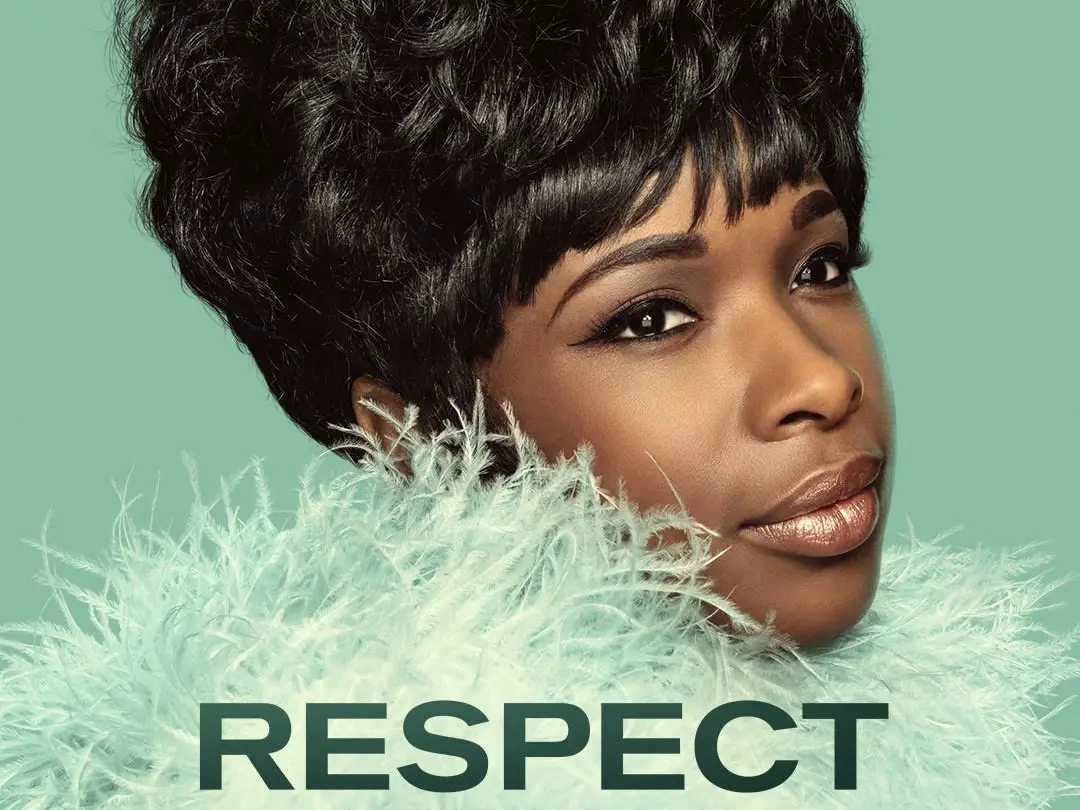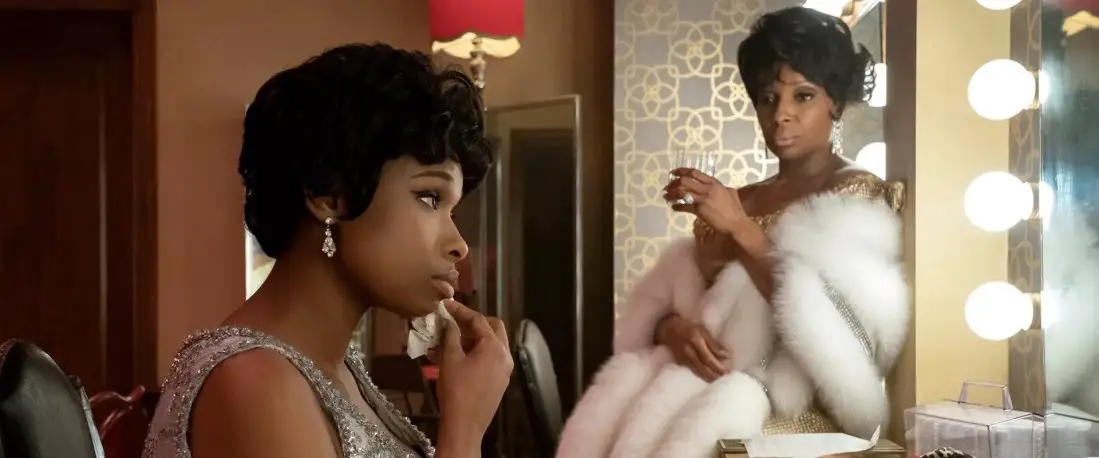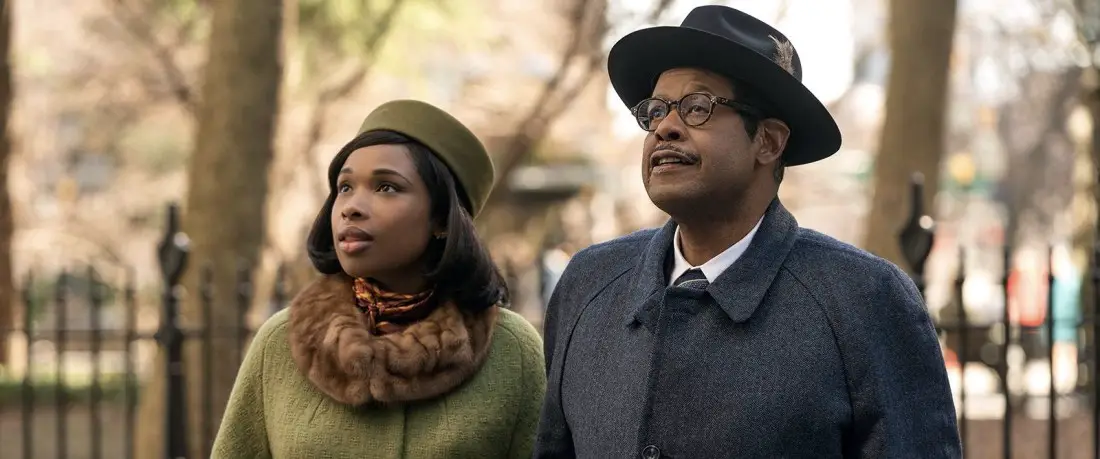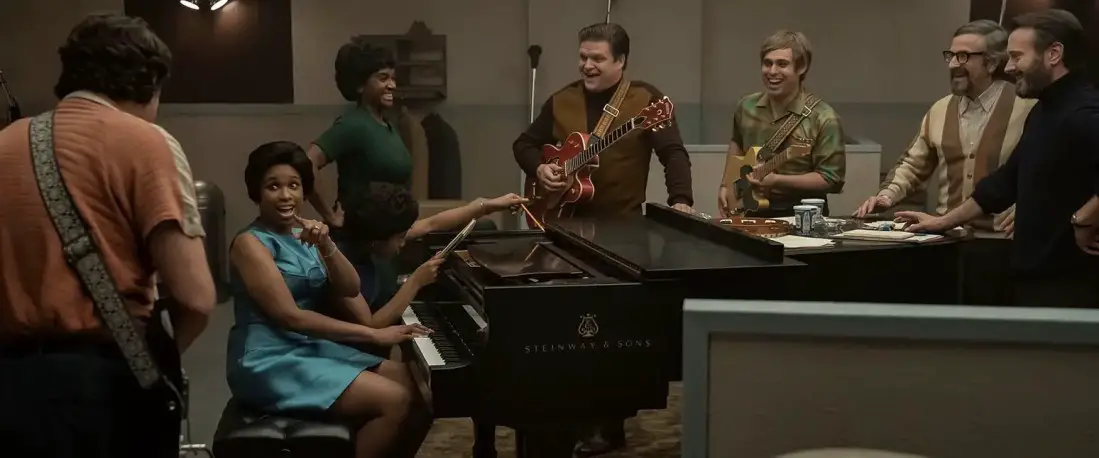I would love to label Respect as yet another tedious music biopic and go about my day. Besides, it’s the latest movie to take a legendary artist and place them in a typical rise-and-fall narrative. Furthermore, it ends with footage of the real-life person and text explaining their later accomplishments. But doing that ignores the fact it gets pretty close to figuring out what it should be. Somewhere in this movie is a story about how childhood trauma and rocky relationships got Aretha Franklin to craft a cover of Otis Redding’s “Respect” so personal it became the definitive version. Not only does this story explain how she became a musical sensation, but it also gives her a sense of agency that makes for a great protagonist. Quite frankly, I would sing a much happier tune if the movie was all about that.
Alas, Tracey Scott Wilson’s screenplay wants to be a lot of other things instead. Sometimes, it’s about how young Aretha (Skye Dakota Turner) used music instead of speech as a way to express herself following her mother’s passing. Other times, it’s about how adult Aretha (Jennifer Hudson) wanted to rebel against her father by being an active participant in the Civil Rights Movement. When it’s not about either of those, it dives into her relationship with producer Ted White (Marlon Wayans) and how his controlling personality gave way to domestic abuse. And when it has nothing else to offer, it basks in Aretha’s greatness through behind-the-scenes work on her most iconic songs.
Considering the plates it needs to spin, it’s no surprise that Respect makes a hash of Aretha’s story. Despite its 145-minute runtime, many moments do not get the attention they deserve. While iconic figures like Martin Luther King Jr. are present, they do not leave a significant impact on the story. Worse than that, however, are the half-hearted attempts at presenting trauma. There’s a moment early in the movie that implies that young Aretha was a victim of sexual abuse. But instead of bringing that traumatic event to the forefront, it instead treats this as nothing but a mere footnote. At most, there is a single flash of that scene when she is on the path to stardom. Even then, it’s clear that her mother’s death is the main contributing factor to her emotional low points.
READ: ‘Ted Lasso’ S2, Ep4 – ‘Carol of the Bells’ Review: “It’s Christmas in Richmond”
Momentum, in general, is a thing that the filmmakers are quite bad at maintaining. Like most music biopics, it places emphasis on its lead performing some of the most recognizable songs of the 20th century. And with someone as talented as Hudson, renditions of songs like “(You Make Me Feel Like) A Natural Woman” are unsurprisingly terrific. However, Respect is so caught up with these sequences that the plot slowly becomes second priority. In fact, there are several occasions in which the film ceases to be a proper narrative altogether. This would be easier to stomach if it didn’t have to share screen time with so many other threads. But as is, the film becomes somewhat of an endurance test.
To its credit, some of the story chunks get better treatment than others. Aretha’s time at Atlantic Records is a striking example of this, as it takes its time showing her work with the Muscle Shoals Rhythm Section. Not only do we see her create an orchestra of her own, but we also see the band members quickly embrace her personality and skills. In just a few scenes, director Liesl Tommy conveys the joy of making music on the spot. And for a brief moment, the movie becomes downright blissful. By no means do these scenes make for surprising cinema. After all, the act of making music is also what made 2018’s Bohemian Rhapsody momentarily pleasant. But when cozy familiarity is the overriding vibe, it’s hard not to walk away satisfied.
Still, Respect rarely benefits from having a director whose experience largely consists of television episodes. On the page, this is a movie full of intimate character beats and groups of people working together to make great music. And under normal circumstances, this would manifest in a dizzying amount of arresting images. In the hands of Tommy, though, it becomes a nearly unbroken series of boring close-ups. This might be a viable option for a smaller scale project, but Tommy fails to realize that this narrative is far from a small-scale one. Sure, there are a few sequences where the camera pulls back to reveal the full size of the crowds. But for something that wants to cover a decades-long journey, it does not have the impactful visuals to match.
If Tommy is good for anything as a filmmaker, it’s in her ability to work with actors. Hudson was always a solid choice to play Aretha, and Tommy smartly lets her be as commanding as possible. However, the big surprises lie in the supporting cast. As much as Wayans does not benefit from the basic characterization of Ted, he makes the transition from suave individual to abusive husband believable. And although Tituss Burgess only gets a handful of scenes, his turn as Reverend Dr. James Cleveland is nothing short of heartwarming. In fact, it’s because of his climactic scene with Hudson that the movie has an ounce of emotional resonance.
But when does anyone want to see a movie that only has an ounce of emotional resonance? The nicest thing I can say about it is that the production heads did their best to work around this tired screenplay. If nothing else, it allows cinematographer Kramer Morgenthau to nicely depict the period setting with warm and hazy lighting. I suppose there are worse ways for a visual accompaniment for a Wikipedia article to turn out. Still, the fact that “visual accompaniment for a Wikipedia article” is such a common outcome reflects badly on music biopics as a concept. And unfortunately, Respect is not one to shatter the status quo. – Mark Tan
Rating: 5/10
Respect is now playing in theaters.
The film stars Jennifer Hudson, Forest Whitaker, Marlon Wayans, Audra McDonald, Marc Maron, Tituss Burgess, and Mary J. Blige.









Leave a Comment